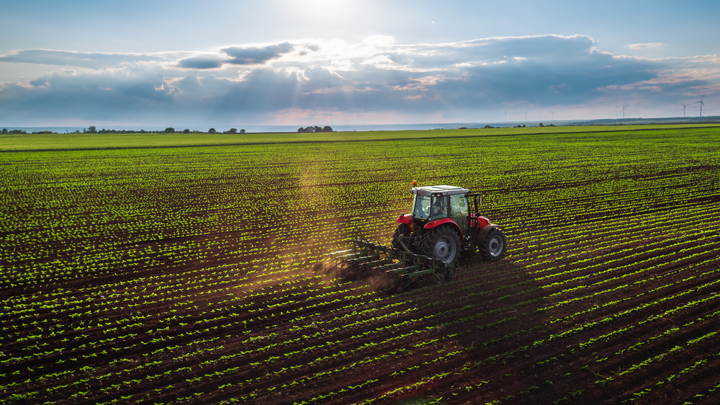IBISWorld presents a collection of fast facts for the different sectors of the UK economy.

Agriculture, Forestry & Fishing
-
The EU has warned the UK it must meet its commitment to check goods entering Northern Ireland before talks can begin on an agrifood trade deal. The agreement, expected by 2027, aims to establish a veterinary or sanitary and phytosanitary agreement to boost agrifood trade between the partners. Any proposed deal aims to reduce costs and paperwork for farmers exporting meat, dairy, eggs and plants to the EU, where UK agrifood exports have fallen since Brexit. Delays risk prolonging uncertainty and keeping trade barriers in place for producers across Great Britain, supplying Northern Ireland and EU markets.
-
Sentiment towards British farming is on the up as “Buy British” narratives take hold. The 2025 AHDB and YouGov survey reveals that 71% of consumers hold a positive view of British agriculture, up from 67% in 2024 and the highest level since the survey began in 2019. 58% of consumers say they are likely to seek out British food over imported alternatives, offering a welcome boost for a sector that has struggled with rising input costs, volatile commodity prices and competition from cheaper imports.
-
Extreme weather delivers a poor harvest, with farmers blaming heavy rainfall followed by prolonged dry spells for damaging yields. Government data released in January 2026 shows that all the main cereal crops saw reduced yields in 2025, except for winter barley. The final estimate of the 2025 UK wheat harvest is 12 million tonnes, an increase of 7.3% on 2024. This is due to a 9.1% increase in area to 1.7 million hectares, tempered by a 1.7% decrease in yield to 7.2 tonnes per hectare. Meanwhile, barley harvest stood at 6.4 million tonnes, a decrease of 10% compared to 2024. Spring barley saw a 16% fall in production and a 5.4% fall in yield, whereas winter barley saw a 1.2% increase in production and a 7.2% increase in yield.
-
A report published by McCain Foods in its inaugural Farmdex release in November highlighted the difficulties facing UK farmers. The survey found that 35% of farmers reported making no profit or only breaking even in the year to July, while just 14% said they achieved profits above 10%. Farmers pointed to continued post-Brexit pressures, including reduced subsidy support and challenging weather conditions, as key factors squeezing margins. Farmers blamed a mix of post-Brexit pressures, including shrinking subsidy support and tough weather conditions, for putting margins under strain.
-
Research carried out by advocacy group Sustain and reported by The Guardian found that intensive livestock “megafarms” are continuing to progress through planning without disclosing their full emissions. This is despite a 2024 Supreme Court ruling requiring all major developments to account for significant direct and indirect greenhouse-gas outputs. Of the 35 planning applications submitted since the ruling, none provided emissions data for the farms themselves, highlighting a major gap in environmental scrutiny.
-
Analysis from the Energy and Climate Intelligence Unit shows that record heat and drought cost Britain’s arable farms around £824 million in lost output in 2025. The losses follow the country’s hottest and driest spring on record and an exceptionally hot summer, which together pushed average yields of wheat, oats, spring and winter barley and oilseed rape roughly 20% below the 10-year average.
-
The UK government has been forced to roll back its proposed inheritance tax changes for farmers after fierce backlash. In the 2025 Budget, Rachel Reeves announced that farmland would no longer be exempt from inheritance tax, with a 20% levy on assets worth more than £1 million. The announcement on 23 December raised the threshold to £2.5 million, meaning just 15% of farms are now eligible, down from the 25% previously.
-
A government-commissioned review found that nearly a third of farms in Great Britain were loss-making in 2023-24, with many unable to generate sufficient income from food production alone to support a household. The report, published in December, found that rising input costs, volatile weather and policy shifts, including the removal of agricultural support schemes, have heaped pressure on farm incomes.
-
From 1 January 2026, a reciprocal beef quota with the US will allow 13,000 metric tonnes of high-quality British beef to enter the American market tariff-free. This should support the UK agricultural sector by opening a higher-value export outlet for beef producers.
-
In February 2026, McCain announced a UK “Farm of the Future” site in North Yorkshire, launching in 2026. Farm of the Future UK will partner with the University of Leeds to provide scientific research and validation to accelerate innovation in British agriculture. McCain’s Farm of the Future UK will be the most advanced Farm of the Future to date, adopting practices like controlled traffic farming, year-round soil cover and biodiversity building. It will also be the first Farm of the Future location to pilot a circular nutrient system. According to McCain’s recent Farmdex research, while many farmers are concerned about the future of UK farming, 77% agree that sustainable practices are essential.
-
UK food and farming groups are urging ministers to build in a transition period amid talks of realigning UK agri-food rules with the EU. Industry-commissioned analysis cited by the NFU and CropLife UK suggests abrupt alignment could cost the arable, horticulture and sugar sectors £500 million to £810 million in the first year, by removing access to some GB-approved crop protection products and undermining control of pests, weeds and disease.
-
UK think tank, the Resolution Foundation, has warned that the drive to meet net zero targets could push many already low-margin farms into deeper financial trouble, with decarbonisation measures adding up to around £1 billion a year in extra costs across the sector.
-
Defra has awarded about £21.5 million to 15 projects in England under its Farming Innovation Programme (with Innovate UK), backing the first wave of funded work on precision breeding (including gene-editing) and on-farm/near-farm technologies to cut agricultural emissions.

Mining
- The Office for National Statistics reports that the mining and quarrying sector output dropped by 2.5% in November 2025. Overall, output from the sector dipped by 1% in the three months to November 2025.
- World Bank Commodities Price Data released in February 2026 shows that the average Brent crude oil and WTI crude oil prices have climbed at the start of 2026 amid heightened global uncertainty and tensions. In Q4 2025, prices were lower than in the previous quarter and compared to Q4 2024. Recently, the International Energy Agency projected a record surplus in 2026, placing severe pressure on oil prices. This is backed by Goldman Sachs, which projects oil prices to decline through 2026 due to a production surge and a large surplus of two million barrels per day.
- Metal prices have been extremely volatile recently, with precious metals recording a huge rise. World Bank Commodities Price Data released in February 2026 shows all metals and minerals recording higher prices in January 2026. Most metals, except lead and nickel, ended Q4 2025 higher than Q4 2024. Meanwhile, gold and silver prices continued to rise, thanks to continued geopolitical tensions and economic instability, with both precious metals reaching record highs. A weakening US dollar and US policymaking concerns have encouraged investors to flock to gold, given its reputation as a “safe haven” asset. Gold surpassed US$5,300 (about £3,400) per ounce on 28 January, before a sharp sell-off eased prices going into February 2026.
- The UK’s Lindsey oil refinery in Lincolnshire has been agreed to be purchased by Phillips 66, a US energy company, after its previous owner, Prax Group, went into insolvency in 2025. However, Phillips 66 has stated that the oil refinery, which processed about 96,600 oil barrels daily in 2024, will not resume operations as a standalone entity, a further blow to the UK’s oil refining capacity.
- According to the Financial Times, energy consultancy Wood Mackenzie reports that no exploration wells were drilled in UK waters in 2025, the first time since the 1960s when oil and gas were found in the area. It also projects for investment to plunge by over 50% in 2026, from £4.4 billion in 2025 to £2.5 billion, the lowest level since the early 1970s.
- EDF is seeking to extend the operation of its Suffolk-based Sizewell B nuclear plant by a further 20 years, to 2055, to ease supply pressures until new nuclear capacity (at Hinkley Point C and Sizewell C) kicks in. The plant provides about 3% of the UK’s electricity and EDF and Centrica could invest £800 million to extend the operation, if the government can guarantee a long-term price for the electricity the plant produces, as per the Financial Times.

Manufacturing
-
In January 2026, UK manufacturing showed a notable upturn, with the S&P Global PMI for the sector rising to 51.8 from 50.6 in December, the highest reading since August 2024 and signalling expansion after recent weakness. Crucially, new export orders increased for the first time in four years, boosting optimism among producers and reflecting stronger demand from Europe, the US and China. While employment continues to fall, the pace of job losses has eased and business confidence is at its highest since before the 2024 Autumn Budget. The improved PMI supports expectations that the Bank of England will hold interest rates at 3.75%, though rising input costs and broader economic uncertainties persist for UK manufacturers.
-
In January 2026, British car, van, truck and bus production fell to its lowest level since 1952 in 2025, with output down 15.5% year on year to 764,715 vehicles, according to the Society of Motor Manufacturers and Traders. The slump reflected a cyberattack at Jaguar Land Rover, the closure of Vauxhall’s Luton plant, model changeovers at Nissan and trade disruption after US tariffs rose to 10% under Donald Trump. With 78% of cars exported, the sector remains exposed to protectionism, particularly emerging “Made in Europe” proposals from the EU. While the SMMT expects a 10% rebound in 2026 and output above one million vehicles by 2027 as new EVs launch, high energy costs and tighter EU rules of origin pose significant ongoing risks.
-
New research from Forterro shows many UK manufacturers and exporters are poorly prepared for the EU’s Digital Product Passport (DPP) regime, which is due to start in 2027 and will require detailed digital records of a product’s lifecycle, composition, traceability and sustainability for goods sold into the EU. Fewer than half (47%) of firms surveyed are even aware of the requirements and only 43% say they are ready to comply, with many citing regulatory complexity, lack of technology and limited internal resources as major barriers; some businesses expect to spend around £28,000 on preparations. This leaves UK manufacturers at risk of losing EU market access or facing penalties if they fail to meet DPP obligations, at a time when exports remain vital to sector recovery.

Utilities
- The UK government has cut subsidies for renewable power generators by tying support to the lower Consumer Prices Index (CPI) rather than the higher Retail Prices Index (RPI), a move designed to save taxpayers an estimated £270 million a year, but which reduces returns for green energy producers and could slow investment in clean power. The change reflects tightening fiscal priorities amid broader market and policy pressures on the energy transition, potentially dampening investor enthusiasm just as the sector grapples with decarbonisation goals and infrastructure costs.
- Major UK water companies are lobbying for the abolition of their regulator, Ofwat, arguing that reforms have slowed and that the sector would benefit from a lighter regulatory regime to boost investment and reduce costs. They claim the slow pace of change means Ofwat will continue to influence household bills and infrastructure decisions for another decade, complicating long-term planning. If successful, this push could reshape regulation in the utilities sector, potentially lowering companies’ compliance burdens but also raising concerns about consumer protections and oversight of essential services.
- UK-headquartered energy company Drax Group has begun a consultation that could see more than 350 roles cut in the UK and North America, representing over 10% of its 3,250-strong global workforce, as it reshapes its operations to focus on energy security and transition to lower-carbon generation. The consultation affects staff across the group as Drax adapts its organisational structure to future market conditions. The GMB union criticised the move as a betrayal of workers and local communities, calling for government intervention to secure a “just transition” for employees. Shares in the company have climbed around 46% over the past year.

Construction
-
Deloitte’s Regional Crane Survey shows UK construction shows signs of resilience heading into 2026, with new project starts increasing across key regional cities – Belfast, Birmingham, Leeds and Manchester – as the number of schemes rose to 53 in 2025 from 47 in 2024, though total units and floorspace under construction dipped slightly. Residential, student accommodation, hotel and office refurbs are driving activity, indicating a healthy forward pipeline and developer sentiment has shifted towards “committed construction” amid strategic public and private investment. Despite challenges like higher costs and regulatory pressures, the outlook for offices, residential and specialised sectors appears more positive for 2026.
-
Begbies Taynor Group finds UK construction firms are facing growing financial stress, with the number in “critical distress” rising by nearly 50% in 2025. The surge reflects tight margins, rising costs and project delays, which have pushed more companies into severe financial difficulty, threatening jobs and supplier relationships across the sector. While some parts of the UK construction pipeline remain resilient with continued starts in residential, retrofit and public projects, the sharp increase in distressed companies highlights fragilities in the industry’s financial health and suggests a tougher operating environment ahead for contractors, especially smaller and mid-sized businesses. The trend underscores the need for stronger cash-flow management and risk mitigation as demand patterns evolve.

Wholesale Trade
-
According to the Office for National Statisforcs, output in the wholesale and retail trade; repair of motor vehicles and motorcycles increased by 0.6% in November 2025. This was driven by a 1.5% rise in wholesale trade, except for motor vehicles and motorcycles.
-
The Institute of Chartered Accountants in England and Wales’ Business Confidence Monitor reveals that retail and wholesalers remain among the least confident businesses in the UK in Q4 2025, with significant concerns relating to weakened consumer demand, tax challenges and regulations and competition.
-
Co-op Wholesale has secured a five-year contract extension to supply all Ascona forecourts across the UK. This is an extension to an agreement that began in 2020, with the wholesalers to supply all 62 forecourts with grocery products, including Co-op's own-label items. In October 2025, The Grocer reported that Co-op Wholesale has further expanded its presence in the forecourt market by signing a multi-year agreement with Tankerford to become its primary supply partner for its 11 forecourt convenience stores.
-
World-leading cooling technology and HVAC wholesaler, Beijer Ref, has moved to consolidate by uniting its three UK businesses and rebranding its Irish operations (Dean and Wood, RW Refrigeration and HRP in England and DWG Refrigeration Wholesale in Ireland) to achieve efficiencies.
-
Lynas Foodservice, one of the largest family-run foodservice distributors across Northern Ireland, the Republic of Ireland and Scotland, has announced the acquisition of Scotland’s leading independent foodservice wholesalers, JB Foods. The move boosts Lynas Foodservice’s reach in Scotland.
-
Citing industry experts, The Grocer reports that AI tools could help wholesalers cut order processing time in half, enhancing efficiency.
-
Mizkan Euro, owner of condiment brands like Branston and Sarson’s, has opted for RH Amar as its exclusive UK distributor. UK food distributor RH Amar also works with food companies like Del Monte.

Retail Trade
-
Theft remains a critical issue for the UK sector, with shoplifting offences rising 5% to 519,381 in the year to September 2025 according to Office for National Statistics data, fuelled in part by organised crime targeting multiple stores. Retailers say theft also drives violence and abuse against staff, undermining worker safety and adding to operational pressures. The government’s forthcoming Crime and Policing Bill aims to remove the £200 “low-level” theft threshold and create a specific offence for assaulting retail workers, but persistent high theft levels continue to dent profitability, increase security costs and strain an already challenging trading environment.
-
In a 27 January British Retail Consortium release, UK shop price inflation unexpectedly rose to 1.5% year-on-year in January, up from 0.7% in December and above the three-month average of 0.9%, signalling that price pressures have not peaked as anticipated. Non-food inflation turned positive at 0.3%, while food inflation climbed to 3.9%, with fresh food at 4.4% and ambient food at 3.1%, all outpacing recent averages. Retailers attributed the inflation surge to high business energy costs and the National Insurance hike feeding through to prices. For the UK retail sector, this means sustained cost pressures, tighter household budgets and continued challenges in balancing competitiveness with margin protection.
-
In its 23 January release, the British Retail Consortium reported a “divided Christmas”, with ONS data showing larger retailers’ sales fell 1.6%, while smaller independents grew 6.4%, highlighting mixed festive trading as consumers tightened spending amid cost pressures. Sales of traditional gifting categories like electricals, books and health and beauty declined as households managed the rising cost of living rather than increased their outlays. Food sales were broadly flat, supported by inflation instead of volume growth. The sector faces ongoing challenges from high business costs, squeezing margins and dampening demand across parts of the UK retail market.
-
Consumer confidence showed some improvement in January, with expectations for the UK economy rising to -32 from -38 and personal financial outlooks moving to -8 from -10, according to BRC-Opinium data – the highest readings in five months. However, retail spending intentions fell sharply to -6 from +6 and overall spending forecasts dropped to +5 from +17, while saving intentions turned positive at +2 from -9, reflecting caution after the festive period. For the UK retail sector, this mix suggests modestly brighter sentiment about finances and the economy but continued restraint in spending, underlining pressure on demand amid cost-of-living challenges.
-
The UK government’s new 40% first-year tax allowance for plant and machinery, effective from 1 January 2026, lets retailers deduct 40% of qualifying capital expenditure, like store fittings, logistics and equipment, against taxable profits in the year of purchase, reducing immediate tax bills and extending relief to leased assets and smaller unincorporated businesses alongside existing full-expensing schemes. This permanent measure was announced in Budget 2025 to stimulate investment in stores, supply chains and tech, particularly benefitting shops upgrading infrastructure. For the UK retail sector, it should lower the effective cost of investment, support growth and modernisation and help offset broader cost pressures, though its impact will vary by company size and investment capacity.
-
In 2025, the UK retail sector suffered a wave of failures and store closures, with 54 major retailers collapsing, 3,080 stores disappearing and more than 30,000 jobs lost according to the Centre for Retail Research. Iconic names, including Claire’s, the high-street arm of WH Smith and Select Fashion went bust, while Quiz Clothing closed 23 stores before a restructuring deal saved parts of the business. Retail sales remain 3.3% below pre-pandemic levels, reflecting weak demand amid high energy, labour and cost-of-living pressures.
Transportation & Warehousing
-
A new pay-as-you-go rail ticketing system that monitors the location of passengers throughout their journey is set to be implemented on a trial basis in England. This initiative is part of a government effort to simplify the complex fare structure of the country's railway network. The pilot will first roll out on routes in the East Midlands, where travellers can check in for their journey using a mobile app that employs satellite technology to track their location. At day's end, passengers will be automatically charged the lowest applicable fare for their travel. If successful, the Department for Transport says this new system will replace traditional paper and mobile tickets that use QR codes, boosting efficiency in rail travel.
-
The UK’s Rail Minister has warned of growing driver shortages across train operators, urging companies to step up recruitment to avoid disruption. Of the 27,000 licensed train drivers in Britain (excluding Northern Ireland), the Aslef union estimates that around 22% of passenger drivers are due to retire within the next five years, raising the risk of widespread service shortages and increased pressure on operators to train new staff.
-
The Department for Transport has announced plans to extend contactless tap-in/tap-out payments to all London airports from December 2025. The upgrade is backed by around £18.7 million in government funding and will cover up to 50 stations across the South East, simplifying rail journeys for millions of passengers.
-
TfL has confirmed an update to the London Congestion Charge, which will rise from £15 to £18 from January 2026. As part of the overhaul, electric vehicles will lose their full exemption. Electric cars will qualify for a 25% discount, while electric vans, HGVs and quadricycles will receive a 50% discount when registered for Auto Pay.
-
Cycling is becoming a mainstream way to move around London. TfL data released in November shows that daily bike journeys have risen 26% since 2019, climbing from 1.05 million to 1.33 million in 2024. The shift reflects sustained investment in safer cycling lanes and shifting attitudes, which are transforming how Londoners commute and travel across the city.
-
The Department for Transport announced a nationwide rail ticket sale running from 6 to 12 January 2026, following the government’s recent fare freeze. The scheme is designed to stimulate demand for travel between 13 January and 25 March 2026, as companies seek to rebuild passenger numbers after a prolonged period of subdued demand.
-
In response to a new VAT regime on minicabs introduced in the 2025 Autumn Budget, Uber has rewritten driver contracts outside London, limiting VAT liability for drivers and helping to maintain fares. The move underlines ongoing tensions between policymakers and ride-hailing companies.
-
Transport for London has recorded a sharp rise in applications for the Knowledge of London test during its 160th year, with numbers increasing from 440 in 2022 to 742 by November 2025, a 69.6% rise and on track to be the highest in a decade. The increase points to renewed interest in the profession, alongside efforts to make the qualification more accessible to a wider range of applicants.
-
Heathrow’s chief executive has urged the UK government to speed up planning decisions for a third runway, as the airport formally begins the planning-application process for a roughly £33 billion expansion intended to allow construction to start in 2029.
-
The Financial Times reports that UK Chancellor Rachel Reeves is set to announce a headline plan to spend up to £45 billion over 20 years upgrading rail across northern England under a revived Northern Powerhouse Rail programme, including new lines, stations and electrification, plus a proposed Birmingham-Manchester link intended to replace the cancelled northern leg of HS2.
-
The UK is tightening road safety enforcement by expanding roadside drug testing, alongside proposals like mandatory eye tests for drivers over 70 and lowering England’s drink‑driving limit. This comes amid a push to cut traffic deaths, with 1,602 people killed on British roads in 2024, as reported by the Financial Times.
-
Newmark’s latest analysis suggests the UK warehousing market has moved past its “cyclical peak” in supply, with availability easing in late 2025 as occupier confidence improved and demand remained resilient. In Q4 2025, the UK availability rate fell to 7.6%, while take-up totalled 12.2 million square foot (sq ft) – above the 10-year pre-pandemic quarterly average – alongside subdued speculative development of 11 million sq ft in 2025 (the lowest since 2017). Newmark also notes occupiers are increasingly prioritising warehouse configuration, automation-readiness and power connectivity.

Accommodation & Food Services
- ONS data reports that output in accommodation and food service activities dipped by 0.7% in November 2025, with accommodation down by 2.3%, one of the largest negative contributions to output in consumer-facing services. In the three months to November 2025, output in accommodation fell by 1.3%, while food and beverage service activities climbed slightly.
- Following the announcement of the Budget, the British Beer and Pub Association has called on the government to introduce a 30% pub-specific business rates relief in a bid to prevent a severe wave of closures and up to 15,000 job cuts. This comes as measures in the Budget mean 4,800 of the smallest pubs face a business rates tax hit for the first time. In response, on 27 January 2026, the government announced that pubs will get a 15% cut to new business rates bills from April (worth £1,650 for the average pub in 2026-27), followed by a two-year real-terms freeze and a review into the business rates valuation method. As reported by the Financial Times, the British Beer and Pub Association estimates that the new measures mean three-quarters of pubs will benefit from business rates bills falling or remaining the same in 2026-27.
- UKHospitality has called for the government to extend support to other hospitality venues like hotels and restaurants, which face significant cost pressures. The trade body has warned that the average hotel’s business rate bill will increase by 115% over the next three years, totalling £205,200.
- While pizza chains are reporting a slowdown in growth and high operating costs, premium pizza sales at the UK’s largest supermarkets are seeing strong growth, signalling consumers are restricting spending on pricey takeaways, a trend noted by consultancy FutureFoodservice and reported by the Financial Times. It points out that while chains like Domino’s and Pizza Hut are recording slow sales, falling profit and store closures, premium supermarket pizza makers like Crosta Mollica are clocking in significant sales growth. The company’s group sales have climbed from £42 million in 2021 to £169 million in the 12 months to August 2025.
- Six years after its collapse, Jamie’s Italian is making a comeback in the UK thanks to a deal with Prezzo Italian owner Brava Hospitality Group. It targets up to 40 UK locations over the next decade.
- In a pre-pack administration plan, TGI Fridays is set to close up to 20 UK sites, resulting in hundreds of job losses.
- Lingering financial challenges faced by consumers have meant that many have cut back on out-of-home dining. As a result, food establishments have begun offering heavy discounts to entice spending, despite the negative impact this could have on their profit margins, as noted by the Financial Times. NIQ’s data tracker, alongside RSM UK, has shown that restaurants’ like-for-like sales contracted in 10 months in 2025.
- According to RSM Hotels Tracker, based on data by Hotstats, the UK hotel occupancy rate climbed from 79.5% to 79.7% in October year-on-year, with the rate reaching 84.1% in the capital. Rates were boosted by a strong rise in Christmas celebrations and festive banqueting. Average daily rates and revenue per available room across the UK also climbed, but higher labour costs meant that growth in gross operating profit was muted in November year-on-year.
- Savills reports that UK hotel investment weakened by 15% year-on-year to £5 billion in 2025. Investment in London significantly outperformed the regions, attracting £3 billion of investment in 2025, a 25% year‑on‑year increase. By contrast, regional market investment volumes slowed to £2 billion, down from £3.3 billion in 2024.

Information
-
ONS data reports that output in the information and communication subsector climbed by 1.5% in November 2025, following a 0.9% dip in October 2025. This rise was mainly because of computer programming, consultancy and related activities, which grew by 2.9% after falling by 3.6% in October 2025. This was the largest positive contribution to growth in services output from a single industry.
-
The latest RootMetrics results for H2 2025 rank EE as the best mobile operator in the UK, while O2 stood at the bottom.
-
Sky’s ‘Stream On: The Future of UK TV’ research by Oliver and Ohlbaum Associates has found that the UK can move to fully internet-delivered TV in the 2030s, with only 2.2% of households left to move over from terrestrial TV. According to the research, 94% of UK adults have internet at home and 92% use a video-on-demand service.
-
The Financial Times reports that large creditors, including NatWest, Lloyds and the National Wealth Fund, are set to take control over rural broadband provider Gigaclear, which has a network of over half a million homes, but has amassed a £1 billion debt pile.
-
Virgin Media O2 owners, Telefónica and Liberty Global, are working together with private equity firm InfraVia Capital to acquire alternative full-fibre broadband network Netomnia for £2 billion. Netomnia is a leading UK altnet, with its fibre-to-the-premises service covering three million UK premises, with the aim to reach five million premises by the end of 2027.
-
The Financial Times reports that UK broadband provider G.Network has been sold to distressed debt specialist FitzWalter Capital, which then applied to put it into administration, as it amassed over £300 million of net debt but has just 25,000 customers. This will likely be followed by others in the altnet sector, which is drowning in debt, with Enders reporting over £9 billion of net debt in the altnet fibre sector at the end of 2025.
-
Virgin Media O2 has announced in February 2026 that it is extending its partnership with Zinkworks to deploy AI-driven automation technology across its mobile network to minimise downtime, following proven results in its fixed broadband segment, where automation has significantly reduced repair times and the need for engineer visits.
-
Following a recent rise in the number of incidents faced by its broadband engineers, Openreach has launched a new mobile safety app in February 2026 to help combat abuse and assaults.
-
UK ministers have laid out proposals to prevent freeholders from blocking full‑fibre cabling in blocks of flats, giving flat owners a clearer right to request gigabit-capable connections. This move would help boost the nationwide fibre rollout.
-
In January 2026, the government opened a consultation on children’s use of mobile phones and social media, with one of the proposals being to ban social media for children. Recently, other than Australia, Spain announced in February 2026 plans to ban social media for under-16s.

Finance & Insurance
-
UK consumers who pay insurance premiums monthly are collectively saving around £157 million a year after the Financial Conduct Authority (FCA) found that more than half of the companies it examined have reduced premium finance interest rates by an average of 4.1 percentage points since 2022, saving roughly £8 on a typical motor policy and £3 on a home policy annually. Among firms identified as higher-risk for poor value, average APR cuts of 7 percentage points delivered bigger savings of about £14 and £4, respectively. The FCA’s market study, drawing on its Consumer Duty framework and falling base rates, concluded that overall costs have fallen without needing price caps, although nearly 23 million policies were paid monthly in 2023 because households often cannot afford upfront premiums. The regulator will continue oversight, but stopped short of mandating interest-free payment options.
-
Santander has launched a new 98% mortgage deal aimed at first-time buyers, allowing loans up to £500,000 with just a £10,000 deposit, breaking past the traditional 95% threshold for major lenders. The five-year fixed-rate product carries a 5.19% rate, no arrangement fee and a £250 cashback, but comes with “very strict” criteria: it’s limited to second-hand houses, excludes flats, new-builds, self-employed applicants and is unavailable in Northern Ireland and applicants’ income must support borrowing up to 4.45 times salary – potentially limiting take-up in high-cost areas. While it could help some aspiring buyers struggling with deposits, critics say restrictions may curb broader affordability gains in the UK housing market.
-
Rising interest rates pushed UK consumers away from credit cards in 2024, with credit-card transactions falling from 14.2% to 12.6% of all payments and debit card use rising from 62% to 64%, as costlier borrowing makes credit less attractive. Cash still accounted for 19.2% of transactions and alternative methods, like BNPL, are more commonly used for larger purchases. This trend signals reduced interest income from retail credit, shifting consumer behaviour towards lower-cost payment products and increased operational focus on debit and alternative payments.
-
In December 2025, the Financial Times reported that private credit firms dramatically increased their exposure to consumer lending, snapping up nearly 14 times more consumer debt in 2025 than in 2024, including riskier products like credit cards and BNPL, signalling rising risk-taking outside traditional banks. This expansion has raised concerns about underwriting standards and potential systemic risk, prompting regulators like the Bank of England to consult major private credit groups on stress tests and flag “alarm bells” over the boom.
-
More than one-third of UK SMEs cut insurance cover last year, with 35% admitting reduced policies and 25% saying underinsurance has worsened, according to Insurance Times reporting Premium Credit research. Around 55% of SMEs now rely on credit to pay for insurance, borrowing on average over £1,000, while many have increased borrowing or shifted to credit cards and premium finance to manage rising premiums and costs. The trend highlights cost pressures driving firms to lower protection or finance it externally, increasing credit risk and impacting insurers’ risk pools, while banks and finance providers see growth in lending for insurance costs.

Real Estate and Rental and Leasing
-
According to Nationwide, annual house price growth increased by 1% in January 2026 compared with January 2025. Prices climbed by 0.3% month-on-month and the average house price stood at £270,873. Growth at the start of the year follows on from heightened uncertainty due to potential property tax changes ahead of the Autumn Budget 2025, which hampered housing market activity at the end of 2025. Nationwide also reported improved affordability in 2025, which has supported demand from first-time buyers.
-
Easing mortgage pricing and receding post-Budget tax fears have boosted estate agents’ optimism about UK housing sales in the short term, according to a survey by the Royal Institution of Chartered Surveyors.
-
Hamptons’ analysis of Land Registry data shows 14.8% of London sellers made a loss in 2025, compared to 8.7% nationally, highlighting a growing share of London homes being sold for less than their previous purchase price, with the capital the worst-performing region.
-
Rightmove reports that UK asking prices for homes newly listed on the market recorded their biggest-ever January rise, as buyer sentiment improved after late-2025 jitters over possible Budget tax changes faded. The rebound in confidence and easing mortgage rates should support transaction activity for estate agents.
-
The government has capped ground rents paid to freeholders on existing properties in England and Wales at £250, with the legislation expected to come into effect in late 2028. The government expects the cap to deliver savings for about 770,000 to 900,000 leaseholders during this parliament.
-
According to CBRE data, capital values for UK commercial real estate increased by 0.1% in December 2025. Rental values climbed by 0.4%, with month-on-month total returns at 0.5%. Capital values climbed by 1.4% over 2025, while rental values hiked by 3.2%, with all commercial property total returns reaching 7.1% in 2025. Retail total returns were 9% over 2025, the highest of all sectors. Meanwhile, total returns for the Office and the Industrial sectors reached 4.6% and 7.7%, respectively, in 2025.
-
Real estate company Knight Frank forecasts that the City of London could see the vacancy rate for prime office space drop to zero by 2028 amid a lack of availability driven by a slowdown in construction and resurging demand.
-
A scarce supply of premium office space and high fit-out and transition costs, which make moving offices difficult to justify, have led large companies in London to opt for renewing leases or refurbishing existing locations rather than relocating. As the Financial Times reports, companies like Accenture, Vodafone, EY, Salesforce, Nomura and Investec all chose to keep their existing main London sites in 2025. Recently, Knight Frank forecast that the vacancy rate for top London office space will reach 0% by 2028, partly due to a lack of new top-tier offices being built since Brexit.

Professional, Scientific & Technical Services
- ONS data reports that output in professional, scientific and technical services climbed by 1.7% in November 2025, the largest positive contributor to services output in the month. This was driven by a growth of 4.6% in accounting, bookkeeping and auditing activities; tax consultancy (following a fall of 2.4% in October) and a growth of 4.5% in scientific research and development (following a fall of 3.5% in October). These contributions to growth were partially offset by a fall of 1.3% in advertising and market research. However, the subsector was the largest negative contributor to the services sector in the three months to November 2025, falling by 0.8%. This was mainly driven by falls in architectural and engineering activities; technical testing and analysis (down 3.4%) and advertising and market research (down 4%).
- Data from the London Stock Exchange Group reveals that there was a 74% rise in takeovers of UK companies by foreign buyers, driven by cheap valuations and marking a post-pandemic high. Meanwhile, the overall value of UK merger and acquisition activity climbed by 20%, while the volume dropped by 16%.
- The UK has dropped the long-awaited Audit Reform Bill, which was intended to address the major UK corporate failures in recent years. The Department for Business and Trade has said it didn’t want to add significant new costs for big companies and argued that audit and reporting practices have improved, while signalling a shift towards “modernising corporate reporting” instead.
- UK top 20 accounting firm Xeinadin, which has recorded substantial growth in recent years thanks to significant acquisition activity, has failed to attract a buyer at its £1 billion price tag. According to the Financial Times, this could potentially signal a waning “investor appetite in professional services” and potential overvaluations in the segment.
- According to an analysis of company reports by the Financial Times, UK mid-tier accountancy firms have sharply increased partner profit, narrowing the pay gap with the Big Four as they win more higher-margin work and benefit from consolidation and regulatory constraints that have pushed some mandates away from the largest firms. It shows average profit per equity partner at the five biggest mid-tier firms reached about £565,000 in 2024 (around two‑thirds of the Big Four average).
- Many self‑employed workers and landlords are reportedly unprepared for the UK’s Making Tax Digital (MTD) changes, which from 6 April 2026 will require those with self‑employed or rental income above £50,000 to keep digital records and send quarterly updates to HMRC using approved software. Advisers warn that awareness is low and many will face new costs and workflow disruption, but could potentially drive demand for accountants, bookkeepers and tax consultants.
- UK central government reduced consultancy spending by 14% in the year to March 2025, with most Whitehall departments (14 out of 17) cutting back and the Home Office making the biggest reduction (down 54%), according to Financial Times analysis of departmental accounts.
- According to the Institute for Government, the plans to scrap the right to a jury trial for defendants facing possible sentences of less than three years in England and Wales, amid a target to ease the backlog of cases, would save less than 10% of court time. The backlog of crown court cases climbed by 9% to reach a peak of 79,619 cases in the third quarter of the year.
- Arbitration is increasingly being used to settle divorce finances in England and Wales, with cases handled through the Institute of Family Law Arbitrators doubling from 89 in 2023 to 178 in 2025 as couples try to avoid delays in an overstretched court system. The rise follows a 2024 rule change requiring separating couples to consider alternative dispute resolution before going to court.
- The Financial Times reports that UK ministers are planning legal changes to undo the impact of the 2023 Supreme Court “Paccar” ruling, which tightened rules on litigation funding and reduced funders’ willingness to back new claims. It states that the reforms will empower citizens to pursue claims, though critics say it could “expose big business to more costly class-action lawsuits”.
- From 5 January 2026, the landmark junk food ad ban has come into force, with advertisements for less healthy food and drinks banned on television before 9pm and online at all times. This marks a move by the government to tackle child obesity, removing 7.2 billion calories from UK children’s diets each year. The government reports that 22.1% of children in England are living with overweight or obesity at the start of primary school, a rate rising to 35.8% by the time they leave.

Education
-
A new UK-wide survey by Ambitious About Autism reveals that one in six autistic pupils (16.2%) has not attended school at all since September 2025, with a further third missing one to five days and many missing more, out of nearly 1,000 families polled. Mental health issues were cited by 62%, unsuitable placements by 20% and physical illness by 30% as reasons for absence – highlighting persistent challenges in mainstream schools’ support for autistic pupils. Parents report anxiety, sensory overload and lack of inclusive provision, while the upcoming SEND system overhaul has met scepticism that it may weaken legal protections and fail to address high absence rates across the UK education sector.
-
In February 2026, the Universities of Greenwich and Kent received formal approval to merge into the UK’s first “super-university”, a new multi-university group set to operate from 1 August 2026 and provisionally called the London and South East University Group, making it the third-largest higher-education provider in the country.
-
UK ministers have dropped numeric targets for international student recruitment, abandoning the previous aim of attracting 600,000 overseas students a year to the UK by 2030. Instead, they have pivoted to a new International Education Strategy focused on expanding “education exports” to £40 billion annually by 2030 through UK universities opening overseas hubs and partnerships.
-
The policy removes UK student number goals, introduces tougher compliance standards for genuine student visas and could see recruitment caps or licence revocations for non-compliant institutions, as inbound study visas have fallen significantly in recent years. While the government says it will still welcome international students, critics warn the shift may dilute campus diversity and alter the financial model of UK higher education.
-
UK ministers have announced a £200 million national SEND teacher training programme aimed at transforming support for pupils with special educational needs and disabilities (SEND) in nurseries, schools and colleges across England. Funding will be deployed over the course of this Parliament, with a new expectation in the SEND Code of Practice that all education staff receive SEND and inclusion training. The programme will offer flexible courses and materials to deepen teachers’ skills in adapting teaching, using assistive technology and creating inclusive classrooms, addressing long-standing inconsistency in staff preparation.
-
For the UK education sector, this investment could improve classroom support and outcomes for pupils with SEND and boost confidence among families. However, some experts warn that training alone may not fully resolve systemic SEND challenges without broader reforms.
-
Analysis by Universities UK (UUK) reveals that funding per undergraduate in England is now only 64% of what it was in the 2015-16 academic year after inflation. In cash terms, this equates to approximately £6.4 billion less spent on teaching for current students compared with a decade ago.
-
According to analysis published by the Office for Students in November 2025, 41% of UK Universities are expected to report deficits in 2026-27, even after inflation-linked rises in tuition fees, reflecting deep financial stress in the sector. This comes amid longer-running funding pressures, stagnant government support and volatile student recruitment, especially from overseas. The mounting deficits are likely to drive course cuts, staff redundancies and institutional restructuring, threatening research capacity and academic jobs. Ongoing financial strain may also weaken global competitiveness and constrain investment in facilities and innovation, with broader implications for UK higher education’s role in skills development and scholarly output.

Healthcare & Social Assistance
-
UK ministers have announced a major crackdown on profiteering by private child social care providers in England, warning companies will be pushed out of the system if found to be “price-gouging” or profiteering after a Competition and Markets Authority review exposed excessive costs and financial risks in the sector.
-
Over 80% of children’s residential homes are run for profit and local authorities spent around £3.1 billion on children’s residential care in 2023-24, nearly double five years earlier, driving unsustainable spending and placing pressure on council budgets. The reform includes heightened oversight, potential profit caps and a boosted £88 million fostering recruitment plan to reduce reliance on costly private placements and improve outcomes for vulnerable children, signalling a strategic shift in England’s social care market.
-
UK health and social care news suggests more doctors’ strikes are now considered unlikely, with a leader of resident doctors saying ongoing negotiations with the government are “increasingly positive” and constructive, despite a fresh mandate for strike action being secured. The British Medical Association deputy chair indicated there is no current intention to call further walkouts, reflecting a shift in tone after protracted disputes over pay and training jobs that have dogged the NHS. While key demands, including substantial pay rises, remain unresolved, the improved dialogue could reduce disruption to services and ease workforce pressures if talks continue constructively.
-
National health leaders are in discussions to overhaul the key ambulance Category 2 response-time target, which currently aims for a formal response within 18 minutes for more than half of emergency calls (including serious conditions like suspected heart attack and stroke) – a standard rarely met nationally.
-
Officials and the Association of Ambulance Chief Executives are considering revisions to how performance is measured, placing greater emphasis on quality of care and potentially splitting Category 2 into more and less urgent incidents to allow slower responses where clinically appropriate, rather than focusing chiefly on clocked times. If adopted, this could reshape NHS performance metrics and relieve pressure on ambulance services struggling to hit rigid time targets, signalling a shift in priorities from speed alone to broader care outcomes.
-
An Integrated Care Board (ICB) in England has revised its year-end forecast from breakeven to a “very serious” near-£200 million deficit. This has been driven by unmet cost-improvement plans and the expected loss of around £49.3 million in support funding, with one acute trust’s own deficit forecast jumping markedly in recent weeks. NHS chiefs are commissioning external analysis and changing financial leadership to address the shortfall, reflecting broader fiscal pressures within the NHS as many ICBs struggle to balance budgets while meeting demand. The looming £200 million deficit underscores systemic funding and efficiency challenges facing health and social care delivery in the UK.
-
A new UK government cancer strategy aims to raise the proportion of people surviving cancer for at least five years to 75% by 2035, up from around 60% based on 2022 data, through commitments to earlier diagnosis and faster treatment for patients across England, according to the BBC. Officials say this would be the fastest improvement in cancer outcomes this century and narrow the gap with other developed countries, though the targets place pressure on NHS diagnostic and treatment capacity already under strain.
-
In February 2026, UK health and social care leaders launched “Project Revive”, a joint initiative by Medicines UK, NHS England and the MHRA to address persistent medicine shortages. They plan to do this by reviving dormant UK-approved licences for 378 essential medicines that have failed to attract suppliers or pose supply-resilience risks, including treatments for complex cancers, thrombosis and schizophrenia. Under the 12-month pilot, manufacturers will be offered a fast-track regulatory pathway and early engagement, plus a dedicated NHS buying framework to clarify volumes and pricing, to make supplying these commercially marginal, but clinically vital products more viable.

Arts, Entertainment & Recreation
-
The UK Department for Culture, Media and Sport (DCMS) has launched a consultation – open until 29 March 2026 – on proposed changes to how the Gambling Commission is funded, focusing on revising licence fees paid by companies to ensure the regulator can meet its obligations and financial pressures. The review, the first since 2021, sets out three options for raising annual operating licence fees from 1 October 2026 – including possible 20% and 30% headline increases, with one model ring-fencing an extra 10% to tackle illegal gambling and protect licensed companies’ revenue. This follows warnings that the Commission’s reserves could be depleted without new funding and reflects rising regulatory costs and expanded duties arising from the Gambling Act Review White Paper. Higher fees would raise costs for land-based venues and entertainment businesses with gambling licences, potentially increasing operational expenses for pubs, bingo halls, casinos and other leisure providers across the UK.
-
UK ministers are under growing pressure to tighten gambling advertising rules after new polling from More in Common, commissioned by the Campaign to End Gambling Advertising, showed 70% support tougher restrictions and 27% favour a total ban on gambling ads.
-
The £12.5 billion gambling sector still spends up to about £2 billion annually on marketing despite existing voluntary limits like a “whistle-to-whistle” code on sports broadcasts. Critics, including MPs and public health advocates, warn that pervasive advertising normalises gambling, especially among children and vulnerable groups, exacerbating harms like addiction and mental health issues and putting additional strain on NHS and social care services.
-
GG.Bet, a well-known esports and online betting operator licensed by the UK Gambling Commission, has surrendered its UK licences and ceased accepting new registrations, deposits and bets, with its platform shutdown scheduled for 9 January 2026. The company is allowing customers to withdraw remaining balances and is voiding bets on events after that date as part of a “planned platform closure”. The exit is widely seen as linked to the UK government’s Remote Gaming Duty rising to 40 % from April 2026, making the market less viable for smaller companies and potentially prompting further exits.
For more information on any of the UK’s 600+ industries, log on to www.ibisworld.com, or follow IBISWorld on LinkedIn.








